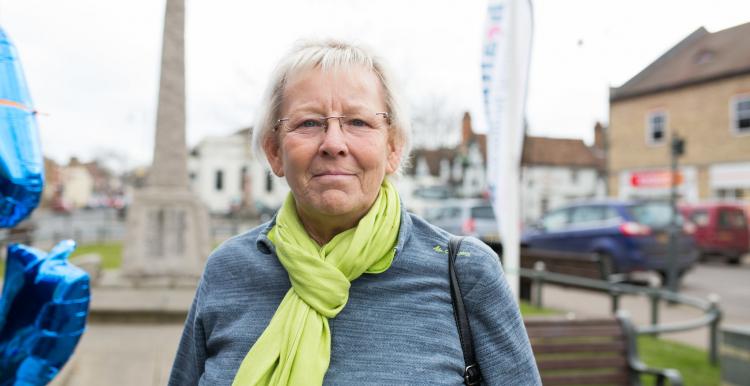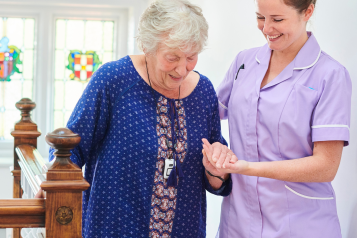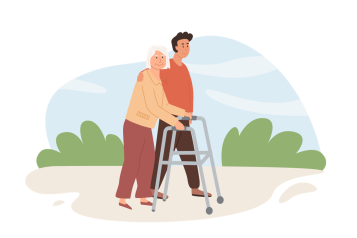My life as a carer – one of seven million stories

Being a carer can be stressful and can happen overnight. How do you adjust? What advice and support services are out there?
This Friday is Carers Rights Day, so I wanted to share my story. Mine is just one story out of seven million in the UK. By telling you about my experiences, I hope to raise awareness of the challenges I and other carers can face.
One story out of seven million
My husband Pete* was diagnosed with Parkinson’s Disease and at first he was one of the lucky ones, having only a tremor. This is a progressive disease of course, so he did deteriorate, resulting in me becoming his full-time carer, particularly after he was diagnosed with cancer too.
When diagnosed, it took us months to get an appointment. We were given a handful of leaflets and told ‘see you in six months'
When Pete was diagnosed, we were given a handful of leaflets by the doctor and told ‘see you in six months’. As we had some savings, we had to pay for Pete’s care ourselves. The council wasn’t able to offer us any financial support at all.
Where do I start?
As his disease got worse, I was in need of practical as well as emotional support. I found that there were a lot of support groups for Pete, but I needed support too. I needed to talk to people in my situation. There wasn’t any support when Pete was originally diagnosed, but through Carers First I found out about a Carers Café. It enables carers to come together to share their experiences and to offer each other comfort and encouragement. It was a lifeline for me.
Through this, I was guided to other groups catering for all sorts of illnesses and disabilities. I was even given an appointment with the fire service to look at escape routes at my house as my husband had limited mobility – it was something I hadn’t even thought about.
Support and benefits for carers
The NHS offers a range of information and advice, from what you need to do to get a carers assessment, to respite care and help for young carers.
When you care for someone 24/7 you haven’t got time to chase.
I found out about a lot of things by accident. There’s a lot of information out there but by so many different organisations. I found myself thinking, where do I start?
Sometimes the problem is knowing something is there but not being able to access it. Towards the end I needed disabled transport as I had a bad back. I found it difficult to find support and never did get to the bottom of it before Pete was too ill. I was so frustrated ringing all these different numbers. In the end you lose the will to live. When you care for someone 24/7 you haven’t got time to chase.
When my husband had a hospital appointment, the sister on shift asked if she could put me in touch with Carers First. From this, I found a day centre which could look after Pete while I had some time to myself. It meant that I could go shopping, do some of the house work, and have a bit of ‘me time’. Being a full-time carer, you don’t get much emotional support!
Things always seem to be worse late at night, you feel even more cut off and helpless.
Feeling helpless
One evening I was left feeling particularly helpless and so upset. Pete was doubly incontinent, and just before he went to hospital, his infection meant that he couldn’t move to help me change him. He just slept. I physically couldn’t do it alone.
I rang the emergency services who put me through to a duty social worker. She told me that the four-hour waiting list meant they couldn’t send anyone out to me as they finished at 10pm (it was 6pm at this point).
I was given the out-of-hours GP service who then referred me to 111. Thankfully, they returned the call with information about the Impact Team – a group of NHS community nurses that offer out-of-hours support. They arrived after midnight, changed him and his position in bed, and returned again the next morning. It was such a relief, I didn’t know what I was going to do.
Things always seem to be worse late at night, you feel even more cut off and helpless. I couldn’t help but think that the situation didn’t need to happen. If the social services team had only known about the Impact Team, I could have had a solution four phone calls and several hours sooner. There doesn’t seem to be any joined-up thinking.
*Kate and Pete are not the real names of the individuals described in the case study above.
What we know
Kate’s experience is not unique. We know that more people are becoming carers and they are doing more than ever. Carers are entitled to and deserve proper support and recognition for the long hours they work. However, while councils and the social care sector continue to face rising demand and pressure, carers struggle to access that support.
Carers are a vital and growing part of our social care system, and we can’t afford to overlook them.


